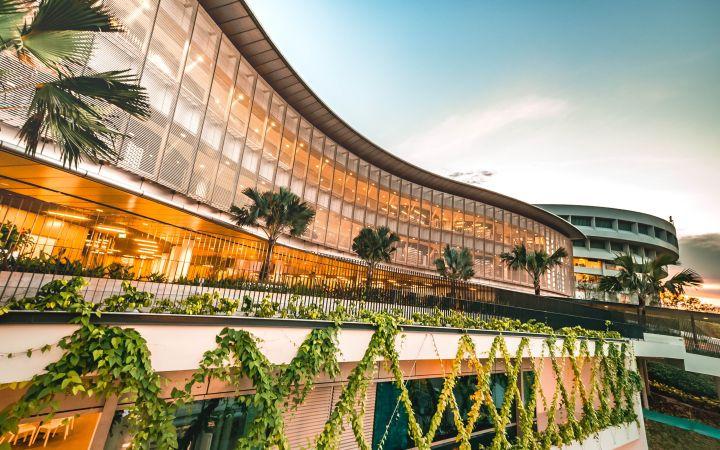
CIFAL Singapore - GLOBAL SUSTAINABILITY: Waste and the City
CIFAL Singapore, Nanyang Environment and Water Research Institute (NEWRI), Association of Pacific Rim Universities (APRU)
The course will provide students with opportunities to develop professional competencies in cross-cultural communication, interpersonal skills, teamwork, while fostering equitable and inclusive partnerships. By conducting case studies in teams with peers from across institutions and regions, the course will provide students with the opportunity to develop cultural competencies and to prepare them for future exchanges with members from various background and cultural contexts.
Sustainability is an important concept that has been driving innovations and economy in recent decades. It is imperative to equip our graduating students with backgrounds on the UN Sustainable Development Goals (UN SDGs) and its applications in the industry. The seminar course introduces graduate students to global sustainability concepts and applications from leading experts in the academia and the industry. Students will learn the key points of the UN SDGs focusing on the environment and economy, specifically those that pertain to waste and urbanization. They will also learn how leaders work with key stakeholders in implementing sustainability in their organizations. By exposing students to real-world Environmental, Social, and Corporate Governance (ESG) reports produced by corporations in various industries, they will practice critical thinking and analytical skills. The course will provide students with the opportunities to interact with leaders from around the world in real-time video conferencing. By conducting the case studies in teams with peers from across institutions and regions, students will develop professional competencies in cross-cultural communication, interpersonal skills, teamwork, while fostering equitable and inclusive partnerships. The course will prepare the students for future exchanges with members from various background and cultural contexts.
Identify key trends and adoption of sustainable management by global organizations. • Analyze the components of sustainability and their impacts policies, programs, and services in the corporate world. • Describe the current and historical role of the UN SDG governance and the various strategies that have been suggested for how to improve it. • Discuss the topics in the ‘Environment’ pillar of Environment, Society, and Corporate Governance (ESG).
Analyze ESG reports of leading corporations in different countries. • Identify key trends, issues, and limitation of the current ESG scoring systems. • Analyze critical components of key successful global sustainability efforts. • Assess critical traits that contribute to successful leadership and past and current leaders that exhibit these qualities.
The course will provide students with the opportunities to interact with leaders from around the world in real-time video conferencing. By conducting the case studies in teams with peers from across institutions and regions, students will develop professional competencies in cross cultural communication, interpersonal skills, teamwork, while fostering equitable and inclusive partnerships. The course will prepare the students for future exchanges with members from various background and cultural contexts. Students will learn the key points of the United Nations Sustainability and Development Goals (UN SDGs) focusing on: - #6 (Clean Water and Sanitation), - #7 (Affordable and Clean Energy), - #9 (Industry, Innovation, and infrastructure), - #11 (Sustainable Cities and Communities), - #12 (Responsible Consumption, and Production), - #13 (Climate Action), - #14 (Life Below Water), and/or - #15 (Life on Land). Topics: • General: UN Sustainable Development Goals (UN SDGs) and Environmental, Social, Corporate Governance (ESG) • Waste: Fast-Moving Consumer Goods (FMCG), agriculture, plastic, medical, and water • Urban Development: urban planning, urban sanitation, ecology, and climate change • Others: oil & gas, technology, and transportation o Each of the topics may also include environmental impacts, value, and energy recovery Programme structure: 10 weeks - APRU Seminars & Presentations (2 hours/week) 1 week – Optional participation at APRU symposium/workshop.
Students actively participating in at least 80% of the course will receive certificate of participations. Sessions (30 hours): • Synchronized: 2 hours/week o First hour: guest speaker o Second hour: (week 1-5) guest speaker; (week 6-12) group projects • Asynchronized: 1 hour/week • Group project: Students will be assigned to two groups: (1) Presentation Group and (2) Discussion Group Presentation Group (10 groups) • Each group: 5-7 students • Each week: 2 groups will present the assigned case study o The presenting group will prepare 3 questions and will lead group discussions • Presentation: 15 minutes/case study (total 30 minutes) Discussion Group (5 groups) • Breakout discussion: 10-15 students • Each discussion group will have at least 1 member from the Presentation group to lead the discussion • Facilitated by faculty member or senior researcher • Discussion: 15 minutes/case study (total 30 minutes)
Lectures delivered by primary instructors, plus guest lecturers • Group reading and discussions • Analysis of case studies on sustainability • Audio-visual materials (i.e., videos, etc.) to highlight topics and themes • Peer-to-peer learning • In-class and online group exercises
The course is designed for graduate students at master’s and doctorate levels from all disciplines. Final-year undergraduate students and alumni are welcome. • Master and PhD students; • Final year undergraduate students (limited) • Alumni (limited)

